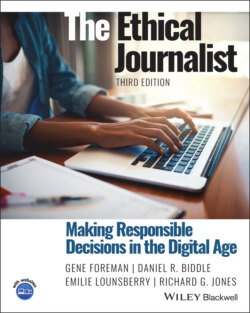Читать книгу The Ethical Journalist - Gene Foreman - Страница 20
Why Standards Are Needed
ОглавлениеThere are also practical arguments for ethical behavior that flow from journalism’s special role in American life.
The First Amendment guarantee of a free press means that, unlike other professionals, such as those in medicine and the law, journalists are not regulated by the state and are not subject to an enforceable ethics code. And that is a good thing, of course. The First Amendment insulates journalists from retribution from office holders who want to control the flow of information to the public and who often resent the way they are covered in the media. If a state board licensed journalists, it is a safe bet that some members of the board would abuse their power to rid themselves of journalists who offend them. The public would be the loser if journalists could be expelled from the profession by their adversaries in government.
But there is a downside to press freedom: Anybody, no matter how unqualified or unscrupulous, can become a journalist. It is a tolerable downside, given the immense benefit of independent news media. Nevertheless, bad journalists taint the reputation of everyone in the profession. Because they are not subject to legally enforceable standards, honest journalists have an individual obligation to adhere voluntarily to high standards of professional conduct. Ethical journalists do not use the Constitution’s protection to be socially destructive.
Yet another argument for sound ethics is the dual nature of a news organization. Journalism serves the public by providing reliable information that people need to make governing decisions about their community, state, and nation. This is a news organization’s quasi‐civic function. But the news organization has another responsibility, too – and that is to survive in the marketplace. Like any other business, the newspaper, broadcast station, or digital news site must earn an income.
The seeming conflict of those two functions – serving the public, yet making money – is often regarded cynically. Decisions about news coverage tend to be portrayed by critics as calculated to draw web traffic, raise broadcast ratings, or sell newspapers rather than to give the citizens the information they need. The truth is that good journalism is expensive, and the best news organizations invest significant sums in deeply reported projects that could never be justified in an accountant’s profit‐and‐loss ledger. If there is a pragmatic return in such projects, it is in the hope that they build the organization’s reputation as a source of reliable information.
No matter how well they do their jobs, journalists cannot expect their work to be universally acclaimed. But they have an obligation to themselves and their colleagues to never deliberately conduct themselves in a way that would justify the criticism. They have an obligation to practice sound ethics.
